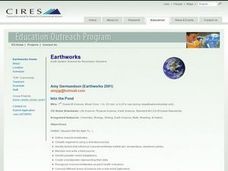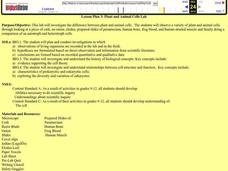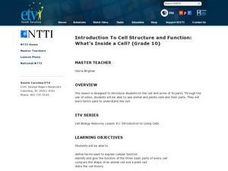Curated OER
Can Bacteria Arise from Non-living Things?
Fourth graders, in groups, determine whether bacteria arises from non-living things,
Curated OER
Ecological Succession in Pond Water Cultures
Students collect samples of pond water, dried grass, and soil in a jar. They predict the order of ecological succession in their pond water cultures. They compare their expected results with their observed results.
Curated OER
Biological Concepts
Students perform a transection of a redworm. They discuss spinal cord injuries in humans. Students compare the ability of the redworm to regenerate the ventral nerve cord with the inability of humans to repair damage to the dorsal nerve...
Curated OER
Does a change in pH affect the growth and survival rate of aquatic plants?
Students determine if changes in pH affect the growth and survival rates of aquatic plants. They evaluate the optimal pH levels for the growth of aquatic plants.
Curated OER
Temperature and Brine Shrimp Eggs
Students determine the optimal temperature at which brine shrimp eggs hatch and develop. They evaluate the changes, if any, which occur in a brine shrimp culture at various temperatures.
Curated OER
pH Change and Brine Shrimp eggs
Students determine if brine shrimp eggs hatch and develop more readily in an environment which has an acid or a basic pH. They evaluate the pH level which is optimal for the hatching and development of brine
shrimp.
Curated OER
DOES A FLUCTUATION IN TEMPERATURE IFFECT THE GROWTH AND SURVIVAL RATE OF AQUATIC PLANTS?
High schoolers determine if different temperatures effect the growth and survival rates of aquatic plants and evaluate the optimal temperature for the growth of aquatic plants.
Curated OER
Into the Pond
Seventh graders use a pond to explore macroinvertebrates and other organisms. They use a dichotomous key to classify the organisms and maintain a journal recording their findings.
Curated OER
Selling Cells: a Study of Organelles and Cell Structure
Students study cellular structures and functions. In this cell function lesson students participate in a class discussion then make a drawing of the cell they are discussing.
Curated OER
Plant and Animal Cells
Young scholars investigate the difference between plant and animal cells. They observe a variety o plant and animals cells by looking at a piece of cork, an onion, elodea, prepared slides of paramecium, human bone, frog blood, and human...
Curated OER
Introduction To Cell Structure and Function: What's Inside a Cell?
Tenth graders are introduced to the cell and some of its parts. Through the use of video, 10th graders see animal and plants cells and their parts. They learn terms used to explain the cell.
Curated OER
Is Your Water Clean?
Students compare water quality of different sources. They test water samples for odor, phosphates, pH, bacteria, and dissolved solids. they fill out a data table and answer questions about their findings.
Curated OER
CSI: Native America
Students discuss the murders of Native Americans in Indiana. In groups, they research and make drawings of the scene as if they were part of a CSI team. They complete any needed experiments to help them solve the crime and create a...
Curated OER
Mushroom
Students identify the different types of mushrooms. In this biology lesson, students explore different mushroom experiments they can do at home. They discuss ways to extend sliced mushrooms' shelf life.
Curated OER
Fish Parasite Survey
Students count nematodes, cestodes and crustaceans on approximately one-hundred and fifty fish. They fill out autopsy reports for external and internal parasites then complete and discuss guide questions to make inferences about parasite...
Curated OER
Fish Parasite Survey
Students survey and dissect as many fish as possible. They count nematodes, cestodes and crustaceans on the fish, fill out autopsy reports, and transfer data to a chalkboard data table. Students graph the results of the entire class...
Curated OER
Mold
Students explore mold, the different types and the health risks that they pose. In this mycelium lesson students grow different molds and see which type of foods mold the fastest.
Curated OER
What Does My Bacteria Look Like?
Students identify Gram positive and Gram negative bacteria using staining techniques. Students research importance of identification of bacterial types in diagnosing bacterial diseases.
Curated OER
Inquiry-based Investigations into Pond Water Microorganisms
Students become familiar with common microorganisms and experience exploring the microbial world.
Curated OER
Shells on the Mountain Top?
Pupils work in groups to remove fossils from sediments, classifying as many organisms and parts of organisms as possible into major groups. They study the data from each formation and make conclusions about the types of organisms and...
Curated OER
Epidemiology: Graphing and Analyzing Health Data
Young scholars graph data on fetal and infant mortality rates collected by the Centers for Disease Control and Prevention. They identify trends in the data and propose potential causes for the trends.
Curated OER
Where Do I Belong?
Tenth graders study the diversity of life in the world. They classify and sketch organisms into the 6 kingdoms.
Curated OER
Electroscope
Students examine what an electroscope is and who invented it. In this electrical lesson plan students build their own Emergency Radiation detector Electroscope.
Curated OER
Pyrites
Students examine the mineral pyrite and discover the differences between it and gold. In this mineral lesson students identify minerals using their common properties.

























